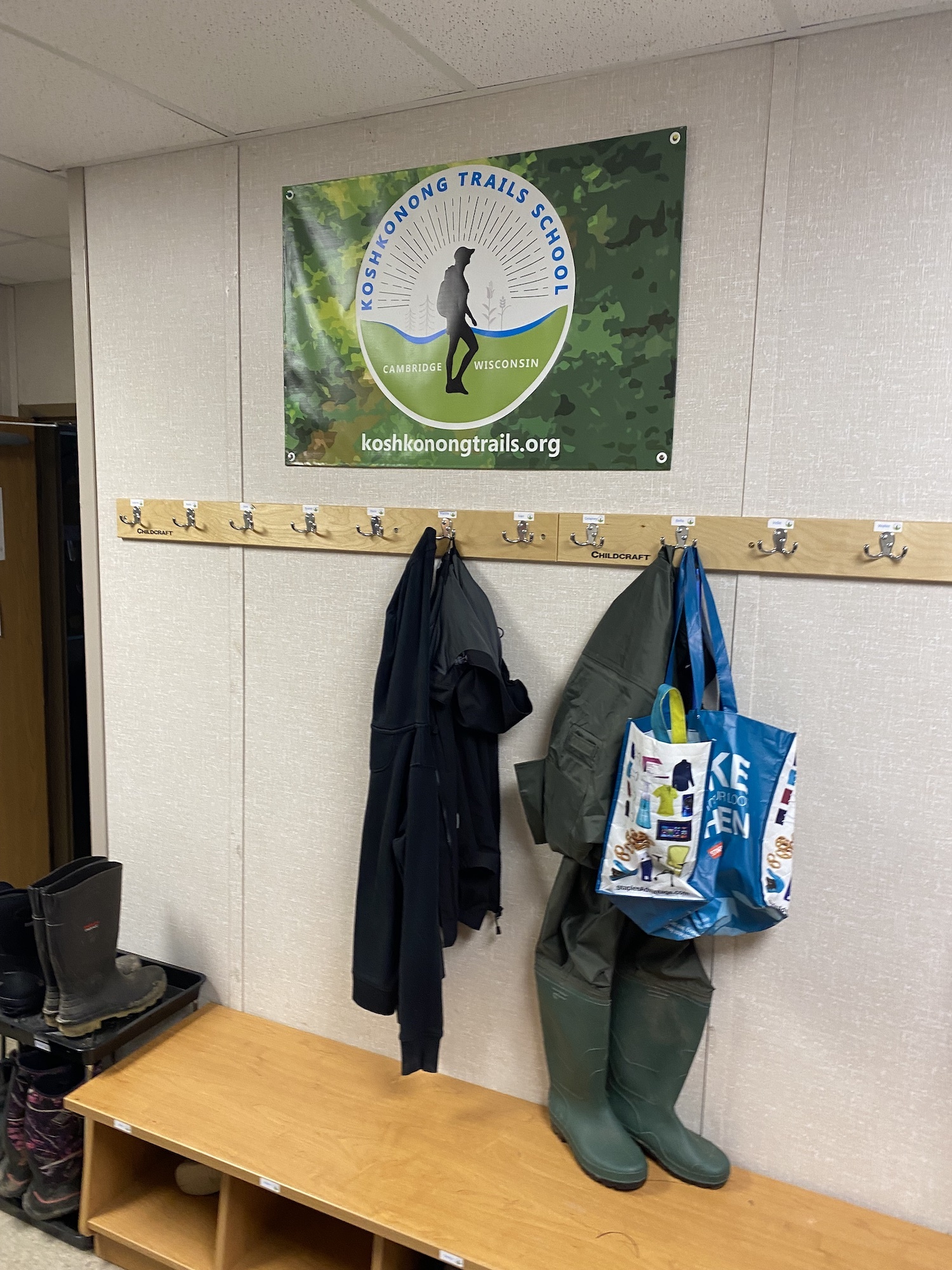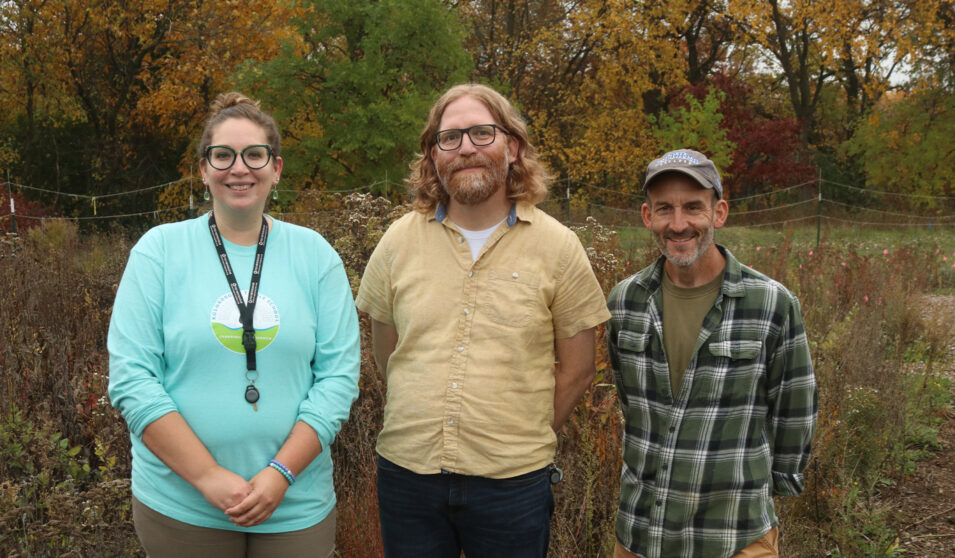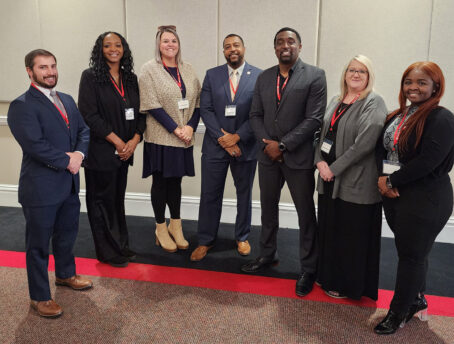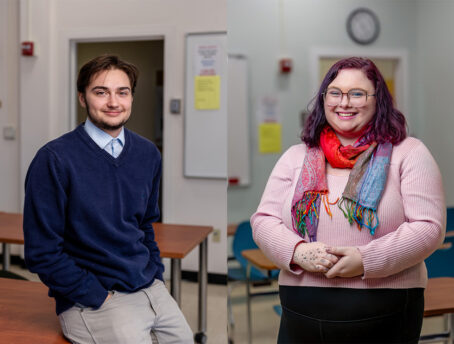Skylar Primm was completely at home while showing the RSC team his classroom, school, and the outdoor classrooms of Koshkonong Trails School at Severson Learning Center in Cambridge, Wisconsin.
Against the backdrop of brilliant fall colors, an end-of-bloom native prairie, and a wide array of farm animals, the beauty and potential of place-based education in rural settings was on full display. Skylar is one of those exceptional educators whose passion and dedication is palpable right away, and you can feel his impact on both students and the field of education as a whole. In this story, we celebrate Skylar Primm’s professional path, his perspective on place-based education, and his unwavering connection to rural students and their unique sense of place.
Skylar Primm’s journey into education didn’t follow a conventional path. Originally from New Orleans, he ventured north while pursuing a master's degree at University of Wisconsin in geology. Eventually, however, Skylar realized that the field wasn’t a fit for his vocation. He felt a strong desire to connect with students and make a meaningful impact on their lives, and had enjoyed when his geology classes featured experiential learning in hands-on, project-based settings.
After graduate school he completed a teacher certification program, and began student teaching: “I came into my student teaching and basically, from day one, it was like, ‘yep, this is what I need to do.’ I was in an alternative school for my student teaching out in Middleton [Wisconsin]. It was very relationship focused. We had circles to start every class.” And, Skylar laughs, “It was more traditional than any of my teaching since then.”

Skylar's passion for project-based learning and place-based education further enriched subsequent jobs, mostly in rural settings around Wisconsin. He fondly recalls that these two concepts intertwined seamlessly for him as he navigated enriching a curriculum with longer-term projects and wider ranging connections to school and community. “We had a required environmental credit, so student’s projects had to have some kind of connection to environmental or sustainability topics, and we did weekly outdoor field experiences.” When Skylar first started, those experiences were one-offs. Eventually, “we built them into being more really place based, where we were really learning and doing and then coming back and doing some kind of extended learning opportunities.”
Now, Skylar works at Koshkonong Trails School (KTS), an environmentally-themed public charter school that students within or outside of the Cambridge school district can elect to go to. Skylar has worked at KTS for two years now, operating as the lead teacher for the last year. The trails school serves students from 7th - 12th grade, and utilizes the 80-acre property of Severson Learning Center for project-based learning opportunities. Features of the grounds include a pond, several miles of wooded trails, a farm with a bevy of animals, and the native prairie.
Initially planted with the 2021 Grants in Place Fellows award, the native prairie outside of Skylar’s classroom window has since tripled in size and literally put down deep roots. Skylar recognizes the potential of the prairie for introductory outdoor education lessons and more, including nature journaling:
“I've had students go out there and you know, do ‘an I noticed, I wonder’ type lessons. We've done a bio blitz out there using the SEEK App on their phones, to just see how many different kinds of things we can identify. And I try to encourage the students to recognize that it’s a pretty sweet thing to have right outside of our window. The number of insects that we can find out there is really astonishing. The number of birds [as well].”
Skylar emphasizes that the prairie serves as a dynamic learning environment for his students, allowing them to witness the changes that occur over time. The colorful grasses and wildflowers provide students with a tangible example of the importance of preserving native plants and biodiversity, and for being aware about and celebrating what’s going on in your local community.
The project-based learning model facilitates a mindset of creation and potential. The prairie wasn’t there prior to 2021, and Koshkonong Trail Schools is in its sixth year of existence. Both, however, are a microcosm of the possibilities for students in rural environments. The small scale of rural schools, and proximity to community allows for innovation and dynamic learning environments to take place, sometimes rapidly. While Skylar didn’t grow up rural, he’s embraced rural teaching, and brings a lens of possibility and empowerment to his students.
Similarly, Skylar offers a perspective of putting yourself out there and asking for help to any rural educators looking for support in the classroom. This could be for professional development, mentorship, and general support: “every teacher I know is willing to help every other teacher that I know. And so I think just reaching out to somebody that's done it before” is invaluable to any emergent educator. Skylar is also the chair of the board of the Wisconsin Association for Environmental education, which has introduced him to a wide array of educators, and that experience has only reinforced his belief that educators are there to collaborate, not compete.
That same spirit can extend to the community, as well. Asking community members for help increases community awareness and buy-in of school projects, connects students with those in their district, and forms meaningful relationships. “We had students that were interested in raising chickens from eggs, I had them write a brief blurb asking and explaining their project and we posted it to our Facebook page and two days later, eggs showed up. And now those chickens are running around out there.”
Rural Schools Collaborative is deeply appreciative of our history with Koshkonong Trail Schools, Severson Learning Center, and Cambridge, Wisconsin. One of Skylar’s next professional journeys will further enrich that connection; as a member of the Rural Schools Collaborative Reciprocity Project, he will continue to open new worlds for his students by connecting with an educator abroad. As the project develops, his students will be given the platform to look into the window of another country as they consider their own place in the world.
Skylar’s commitment to place-based education and the well-being of his students has made him an inspiring figure in education, and his work in rural communities reflects the positive impact that dedicated teachers can have on the lives of their students. As a rural teacher, he not only imparts knowledge, but also instills in his students the belief that they control the opportunities available to them. Skylar Primm's story reminds us that education, when grounded in place and purpose, has the potential to transform lives and communities.




